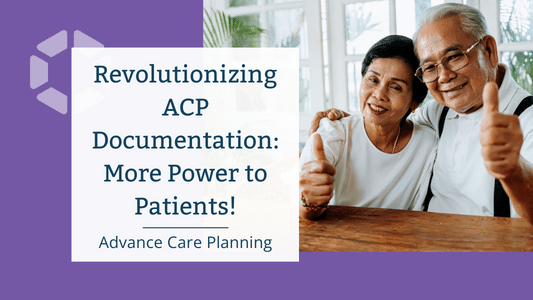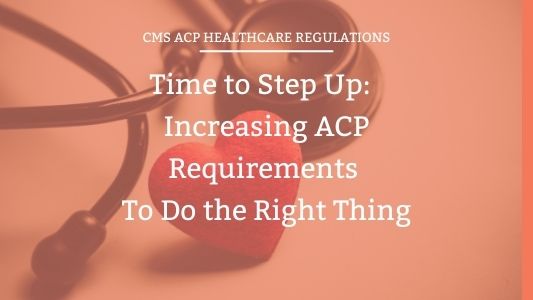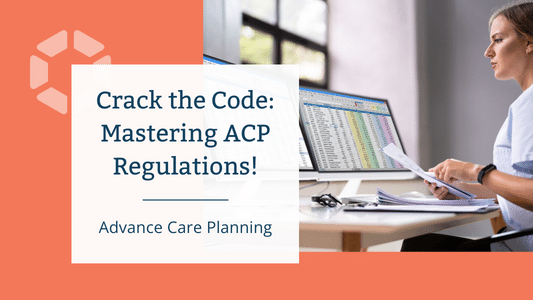
The Sixth and Final Post of Our Series: Confronting Advance Care Planning Misconceptions
Welcome to the final post in our six-part blog series on Advance Care Planning (ACP) misconceptions that call into question the efficacy of ACP programs.

More specifically, we addressed these five advance care planning barriers:
- Normalizing the discussion of one’s mortality and end-of-life decisions.
- Selecting and educating a healthcare surrogate to speak on the patient, resident, or member’s behalf.
- Drafting dynamic, actionable ACP documents and portable medical order (PMO) forms that accurately reflect one’s values.
- Ensuring ACP documents and PMO forms are accessible in an emergency.
- Complying with regulatory mandates to engage Medicare eligible beneficiaries in ACP.
Throughout this series, each post focused on three areas: 1) ACP challenges and issues; 2) recommendations to improve ACP Programs; and 3) how to leverage existing technology to overcome ACP obstacles.
Now it’s time to recap key takeaways for each ACP challenge, summarize our beliefs on the primary benefits of a comprehensive ACP program, and highlight how tech-powered advance care planning is a game changer.
Post 1 – Managing the Unavoidable Conversation: Addressing Mortality
 Everyone – patients, healthcare providers, and payers – finds discussing one’s mortality when grappling with severe illness, debilitating pain, or impairment incredibly emotional and challenging. So, we often avoid the conversation all together. Yet, these complicated and intensely personal advance care planning conversations can also be immensely beneficial in identifying one’s goals of care and giving all stakeholders peace of mind they are honoring the wishes of those in their care when they can’t speak for themselves.
Everyone – patients, healthcare providers, and payers – finds discussing one’s mortality when grappling with severe illness, debilitating pain, or impairment incredibly emotional and challenging. So, we often avoid the conversation all together. Yet, these complicated and intensely personal advance care planning conversations can also be immensely beneficial in identifying one’s goals of care and giving all stakeholders peace of mind they are honoring the wishes of those in their care when they can’t speak for themselves.
To ease the process, we believe ACP discussions should be normalized and stratified based on a patient’s prognosis. By making ACP a regular part of healthcare provision, we not only provide holistic care to those we serve but also pave the way for a healthcare system that is patient-centric, cost-effective, and high in quality.
Embracing technological solutions can help everyone navigate this challenging yet essential part of healthcare provision, leading to improved outcomes and an enhanced patient, resident, and member experience. Existing digital advance care planning software platforms including MyDirectives® and MyDirectives for Clinicians™ use intuitive question and answer format to guide advance care planning conversations, capture one’s medical goals, treatment priorities, and care preferences, and ensure ACP documents and PMO forms are always available across the healthcare continuum.
Post 2 – The Crucial Role of Healthcare Agents in Advance Care Planning
 Choosing a healthcare agent, also known as a surrogate or proxy, requires more than putting a name down on a form. It demands identifying someone who understands and trusts a person’s decisions and will be courageous enough to uphold the individual’s values during strenuous circumstances.
Choosing a healthcare agent, also known as a surrogate or proxy, requires more than putting a name down on a form. It demands identifying someone who understands and trusts a person’s decisions and will be courageous enough to uphold the individual’s values during strenuous circumstances.
To build mutual understanding, we believe in advance care planning is the bridge. Studies show that healthcare advocates that have participated with the patient in advance care planning make better-informed decisions and experience less fear, depression, and emotional distress during the grieving process.
Best in class advance care planning software tools, such as MyDirectives Solutions, do more than fill in the blank with the name of a healthcare agent. The tools help engage surrogates in the ACP process to make sure they comprehend a person’s values and can be reached in an emergency to assist in patient-centered decision making.
Post 3 – Revolutionizing ACP Documentation: Power to Patients
 For many, ACP often degenerates into a checkbox exercise, lacking in-depth discussions about a patient's prognosis, the impact of future medical decisions on the patient's quality of life, and realistic plans for implementing the patient's wishes. Most advance care planning systems are bogged down with paper documents laden with medical and legal jargon. These documents do not effectively reflect patient wishes with actionable information, and they create barriers to ACP, especially for marginalized populations.
For many, ACP often degenerates into a checkbox exercise, lacking in-depth discussions about a patient's prognosis, the impact of future medical decisions on the patient's quality of life, and realistic plans for implementing the patient's wishes. Most advance care planning systems are bogged down with paper documents laden with medical and legal jargon. These documents do not effectively reflect patient wishes with actionable information, and they create barriers to ACP, especially for marginalized populations.
To be effective, we believe advance care planning shouldn’t be a check-the-box, one-and-done, set-it-and-forget-it exercise. Instead, ACP programs must allow for quick and easy ACP document and PMO form updates as circumstances change to truly improve the delivery of goal-concordant care.
Both MyDirectives for Clinicians and MyDirectives software tools support creating dynamic, actionable, digital documentation, uploading existing paper documents, and recording patient voice in video. By making ACP more patient-centered and adaptable, we can improve the quality of end-of-life care and ensure that patient wishes are accurately reflected and respected.
Post 4 – Emergency Ready: Smashing Barriers to ACP Document Use
 In emergency situations, when urgent decisions about treatment and care should be informed by patient voice, critical ACP documents and PMO forms are often nowhere to be found. Painstakingly discussed and recorded on paper or in physician notes, most advance directive information ends up forgotten at home, stowed in safe deposit boxes, filed away in legal offices, or siloed in an EMR.
In emergency situations, when urgent decisions about treatment and care should be informed by patient voice, critical ACP documents and PMO forms are often nowhere to be found. Painstakingly discussed and recorded on paper or in physician notes, most advance directive information ends up forgotten at home, stowed in safe deposit boxes, filed away in legal offices, or siloed in an EMR.
To ensure ACP document use, we believe the path to universal ACP accessibility is through interoperability. That’s why we champion the Advance Directive Interoperability (ADI) with Fast Healthcare Interoperability Resource (FHIR) implementation guides (IG), a project aimed at advancing interoperable data standards for the exchange, integration, sharing, and retrieval of ACP information.
The existing ADVault Exchange™ offers the only HITRUST r2-certified, cloud-storage solution that provides seamless interoperability into all the leading electronic database platforms for hospitals, healthcare payers, and medical practices, including Electronic Health Records (EHR), Electronic Medical Records (EMR), Patient Health Records (PHR), Patient Portals, and Health Information Exchanges (HIEs) within the Carequality framework and the eHealth Exchange and Commonwell Alliance.
Post 5 – Crack the Code: Mastering ACP Regulations
 Congress, states, and the Centers for Medicare and Medicaid Services (CMS) have structured regulations and incentives for healthcare payers and providers to stimulate ACP. Mandates require educating the community on advance care planning, making the ACP available, engaging network providers in ACP, tracking performance, and providing compliance reporting. But recent audits reveal payers and providers are struggling to meet mandates.
Congress, states, and the Centers for Medicare and Medicaid Services (CMS) have structured regulations and incentives for healthcare payers and providers to stimulate ACP. Mandates require educating the community on advance care planning, making the ACP available, engaging network providers in ACP, tracking performance, and providing compliance reporting. But recent audits reveal payers and providers are struggling to meet mandates.
We believe there's never been a better time to embrace advance care planning – not just as a regulatory mandate but as an ethical imperative, a cornerstone of value-based care, and an opportunity to genuinely respect and deliver on what patients’ value most.
MyDirectives Solutions provide a comprehensive package for navigating the complex ACP compliance landscape including reports and analysis, management dashboard, compliance and reimbursement reports, data exporting, and eligibility file integration.
Tech-powered advance care planning is changing the rules of the game. Together we can create a future where ACP is the norm, not the exception. More importantly, all stakeholders have peace of mind those in their care have a voice when they can’t speak for themselves.
Be sure to subscribe to our blog for updates, and don’t hesitate to reach out with any questions or for further support in your ACP ventures.
Let’s get started on digital ACP together
Secure, Interoperable, Accessible.
MyDirectives offers the only digital advance care planning (ACP) tools and interoperable cloud-based storage that is HITRUST Risk-Based 2-year Certified.






